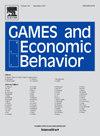优化连续激励:奖励过去还是激励未来?
IF 1
3区 经济学
Q3 ECONOMICS
引用次数: 0
摘要
我们研究连续过程,其中代理人通过昂贵和不确定的投资创造价值,成功引发其他人进一步的投资决策。本文的重点是设计最优分配规则,将产生的总价值分配给各个主体,平衡对过去贡献的认可和对未来投资的激励。我们证明了在任何这样的规则诱导的博弈中存在均衡,并确定了在顺序过程中使总体期望福利最大化的唯一投资配置。这个轮廓可以通过一个简单的规则来支持平衡。此外,我们还展示了一种独特的投资配置文件,使发起人的预期收益最大化,并为发起人设计支持它的规则提供了一种方法。我们将模型扩展到代理的投资受到流程中产生的价值约束的场景。我们的研究结果表明,优先考虑短期激励的相对简单的奖励结构可以有效地实现长期的系统性目标。本文章由计算机程序翻译,如有差异,请以英文原文为准。
Optimizing successive incentives: Rewarding the past or motivating the future?
We study sequential processes where agents create value through costly and uncertain investments, with success triggering further investment decisions by others. Our paper focuses on designing optimal allocation rules that distribute the total value generated among agents, balancing the recognition of past contributions with incentives for future investments. We prove the existence of equilibrium in the game induced by any such rule and identify a unique investment profile that maximizes the overall expected welfare in the sequential process. This profile can be supported in equilibrium by a simple rule. Additionally, we show that there is a unique investment profile maximizing the initiator's expected payoff and provide a method for the initiator to design a rule supporting it. We extend the model to scenarios where agents' investments are constrained by the value generated within the process. Our findings demonstrate that relatively simple reward structures that prioritize short-term incentives can effectively achieve long-term systemic goals.
求助全文
通过发布文献求助,成功后即可免费获取论文全文。
去求助
来源期刊

Games and Economic Behavior
ECONOMICS-
CiteScore
1.90
自引率
9.10%
发文量
148
期刊介绍:
Games and Economic Behavior facilitates cross-fertilization between theories and applications of game theoretic reasoning. It consistently attracts the best quality and most creative papers in interdisciplinary studies within the social, biological, and mathematical sciences. Most readers recognize it as the leading journal in game theory. Research Areas Include: • Game theory • Economics • Political science • Biology • Computer science • Mathematics • Psychology
 求助内容:
求助内容: 应助结果提醒方式:
应助结果提醒方式:


